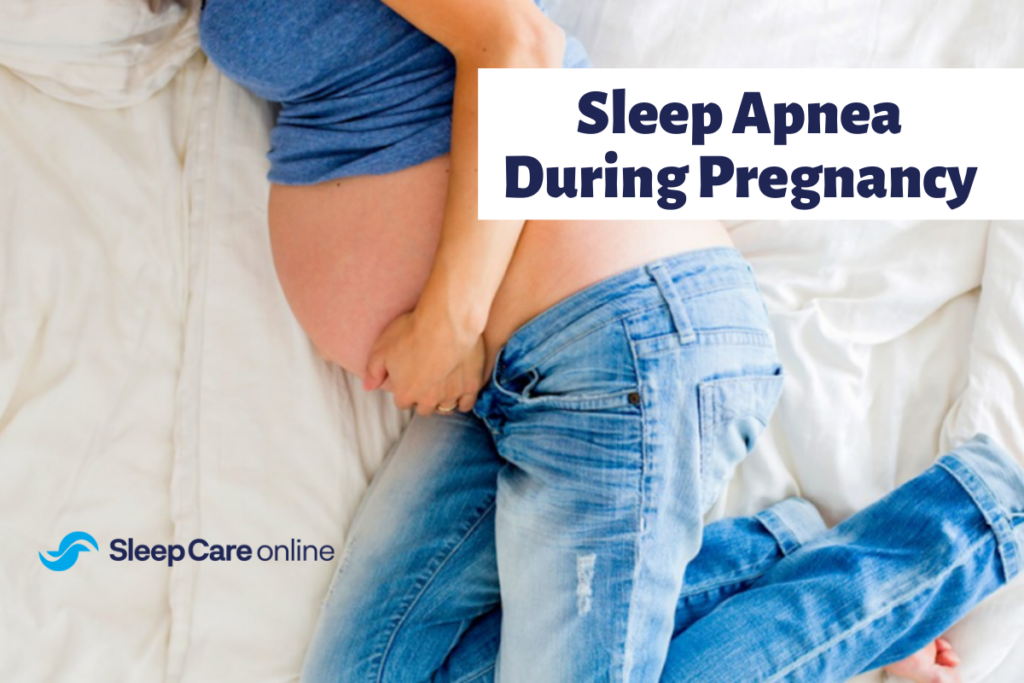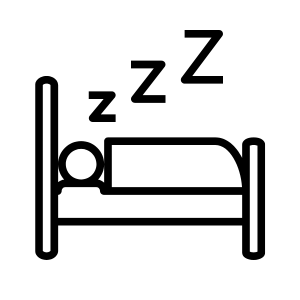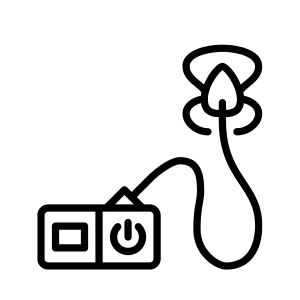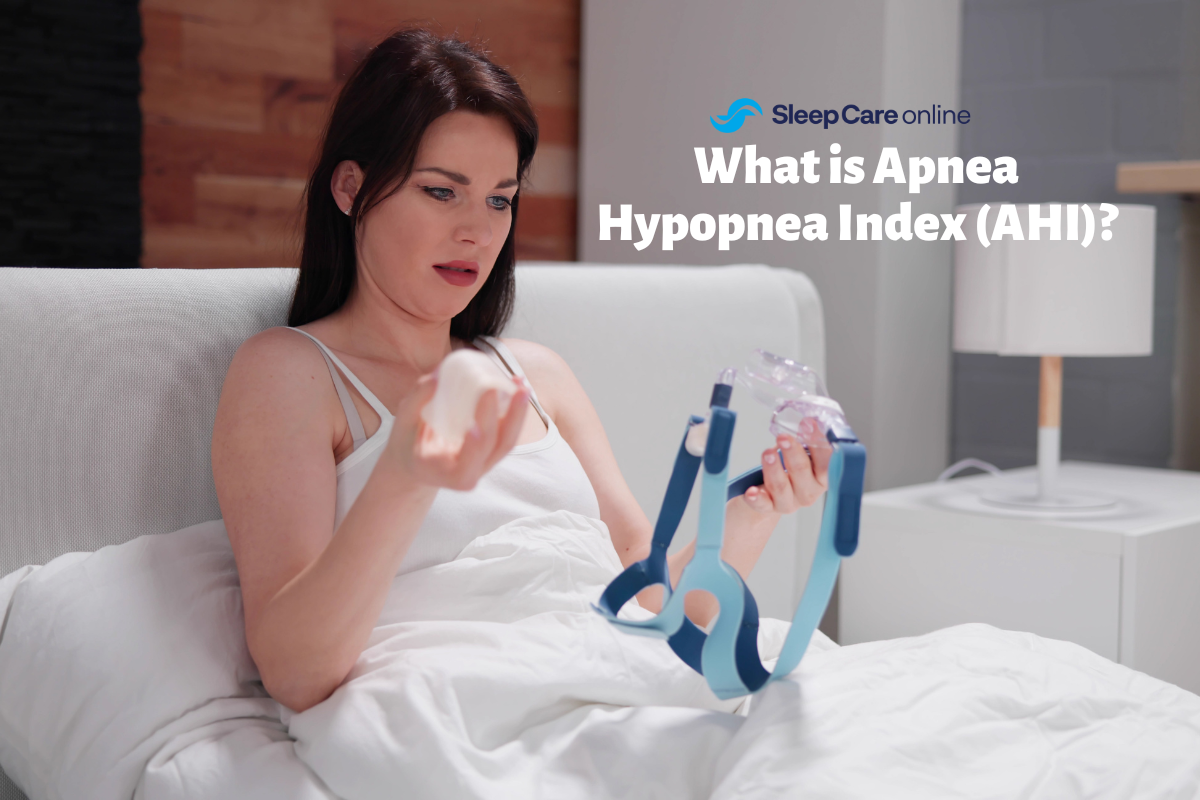Key Takeaways:
- Sleep apnea is a sleep-related breathing disorder that can be common during pregnancy, potentially causing risks for both the mother and baby.
- If sleep apnea goes undiagnosed in a pregnant woman, the risk of complications during pregnancy is increased, including migraines, daytime fatigue, inability to focus, and more.
- The increased weight gain is usually why some pregnant women develop sleep apnea. Learn more about sleep apnea during pregnancy in this article by Sleep Care Online.

Although some disruptive sleep is expected during pregnancy, repeated patterns of interrupted breathing throughout the night are not common. If the uneasy sleep is due to obstructive sleep apnea (OSA) and the condition is left untreated, the complications may be severe. Therefore, it is important to distinguish restless sleep from untreated sleep apnea—especially during pregnancy.
In one small study, researchers found that 10.5% of women in the first trimester and 26.7% of women in the third trimester had OSA.1 The data suggests that potentially many pregnant women are unknowingly dismissing symptoms as pregnancy-related rather than indications of a treatable medical condition. Left untreated, complications from OSA include daytime fatigue, migraines, and an inability to concentrate or focus. Over time, OSA can contribute to cardiovascular disease, diabetes, and strokes.
Sleep Apnea in Women
Sleep apnea tends to occur in one out of four women. As women are reaching menopause about 20 percent or more women will develop sleep apnea. This percentage is influenced by other factors (besides gender) such as body mass index. About 14 percent of women aged between 55 and 70 have severe sleep apnea when their BMI is equal to or greater than 30.
Can You Develop Sleep Apnea During Pregnancy?
You can develop sleep apnea during pregnancy due to the increased weight gain. Sleep apnea occurs more often in women who are overweight or obese, so weight gain during pregnancy could increase the risk of having sleep apnea. If you are pregnant and think you may have sleep apnea, it is recommended to talk to your OB-GYN or your physician.
Is Sleep Apnea During Pregnancy Dangerous?
Maternal implications include a higher risk of gestational hypertension, preeclampsia, gestational diabetes, severe cardiovascular morbidity (including heart failure and pulmonary edema), and increased rates of cesarean and assisted vaginal delivery. Women with untreated sleep apnea during pregnancy face numerous health risks to themselves and their unborn children.
Women with sleep apnea were also more likely to develop preeclampsia, which is a high blood pressure disorder that occurs during pregnancy, according to experts. Babies born to mothers who suffer from OSA are more likely to be delivered via cesarean section and admitted to neonatal critical care units.
In one study, 15% of the women diagnosed with sleep apnea were obese and suffering from chronic high blood pressure. Obesity, as we know, is a significant contributing factor to sleep apnea in both men and women. Therefore, pregnancy may intensify the risk of sleep apnea in women who are already obese. Left untreated, this can cause health concerns for both mother and child.
Does Sleep Apnea Affect the Baby During Pregnancy?
If a pregnant woman has sleep apnea, it can affect the baby in a few ways. First, the repeated pause in breathing can cause an increased blood pressure in the woman which could result in less blood flow to the baby, which could also drop the baby’s oxygen blood levels too. Second, when a pregnant person’s sleep is continuously interrupted, it could lessen the amount of growth hormones being released. This could lead to growth problems and even developmental issues for the baby.
What are the Symptoms of Sleep Apnea While Pregnant?
A sleep test may be needed to diagnose OSA if one or more of these symptoms are present:
- Loud snoring
- Waking up gasping or choking for air
- Excessive daytime fatigue
- Morning headaches
- Moodiness, forgetfulness, or difficulty concentrating
Lifestyle Adjustments For Managing Sleep Apnea During Pregnancy
There are a few lifestyle adjustments to help manage sleep apnea if you are pregnant. They include:




Undiagnosed Sleep Apnea & Pregnancy
Even though sleep apnea is uncommon in pregnant women, it is still crucial to have a good diagnosis. Undiagnosed sleep apnea during pregnancy can lead to problems with the child’s growth, as well as other health concerns and issues. Sleep apnea problems may often improve after pregnancy.
How to Get Diagnosed for Sleep Apnea During Pregnancy
If you think you may be at risk for sleep apnea, purchase a Complete Care Package from Sleep Care online. With Complete Care:
- At checkout, fill out a brief sleep & health questionnaire
- Receive your disposable NightOwl home sleep apnea test in the mail
- Take the test, and in the morning upload your results to the cloud
- Schedule a 10-minute telehealth visit with one of our sleep practitioners
- Receive your script for PAP therapy, if warranted
Have questions about getting started? Call us at 866.465.4478 or email us at [email protected].
References
- Balserak B. Sleep disordered breathing in pregnancy. Breathe (Sheff). 2015 Dec;11(4):268-277.
- Sleep apnea in pregnancy may harm mom and baby. Live Science. 2012 Sep 12.

Dr. Kunal Agarwal is a highly accomplished board-certified physician specializing in Family Medicine, Sleep Medicine, and Obesity Medicine. He completed his residency at Michigan State University and a fellowship at Henry Ford Health System, and has over a decade of experience delivering exceptional patient outcomes. Dr. Argarwal is passionate about patient education and advocacy, sleep disorders, and more. His expertise in treating sleep apnea is extremely valuable to improve his patients’ lives.
Awards, Honors, & Recognition
Top Doctor
SRQ Magazine and Sarasota Magazine, 2023-2024
Fellow of American Academy of Sleep Medicine (FAASM)
American Academy of Sleep Medicine, 2021
Named “Top Doctor” for 2017, 2018 (on cover), 2019,and 2020 by Delaware Today Magazine
2017-2020




